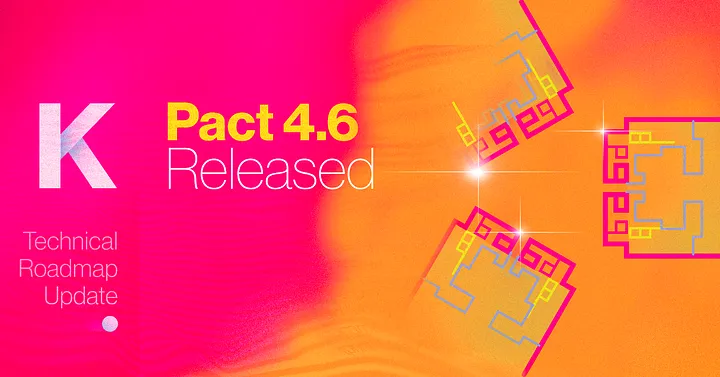Pact 4.6 is In (pre)Flight
Kadena is hard at work offering new and improved visions of the blockchain industry and its tooling. In particular, the Pact team is happy to announce improvements to the Kadena public blockchain Pact API in conjunction with developments and new additions to the language itself. As Kadena matures, we are bringing a new focus to the User Experience/Developer Experience of the platform and its tools, which includes envisioning future L2 solutions in the ecosystem. To initiate these efforts, Kadena presents the following new features:
Zero Knowledge Primitives
As a result of the new collaboration between Kadena and Electron Labs, Pact has included several new built-in functions that allow users to build zero-knowledge solutions.
-
pairing-check: performs the pairing and final exponentiation points in BN254 curve pairs. -
point-add: adds two points together that lie on the curve BN254. Point addition is either in F_q or in F_q^2. -
scalar-mult: multiplies a point that lies on the curve BN254 by a scalar integer value.
Together, these natives provide the basis for Zero-Knowledge proof construction and verification. While proof generation is still something the user would need to supply in the meantime, this allows at least the point calculation and proof verification to exist on-chain, providing a strong cryptographic witness to ZK proofs in a decentralized execution environment.
Improvements to Formal Verification
The Pact team recently welcomed Robert Soeldner to the team as a Haskell
developer and as the point person on Pact’s built-in formal verification engine.
Within a relatively short period of time, Pact has ended up with many upgrades
to outstanding bugs in the FV system, as well as a wealth of UX advancements to
the surrounding instrumentation. Among the fixes are enhancements to the
typechecker and various outstanding warnings for known issues with certain
built-ins like select, in addition to the ability for users to study SMTLib
output on a per-module basis using the verify debug flag overload.
Bringing Errors Back to the Blockchain
One of the sorely missed features that went away in the most current iteration
of the Kadena public blockchain was error output from the /send endpoint. This
created a lapse in error coverage, where the /local endpoint, Kadena’s
node-local transaction simulation endpoint, was not robust enough to provide
accurate error messages. /send, the previous means by which transaction errors
were generated, now failed to do so. Hence, we decided to improve the /local
endpoint to the point where it would all but subsume transaction simulation
using /send. While we at Kadena understand that this was a rather difficult
period for users, we are offering a two part solution in two separate
installments:
-
/localnow features a pre-flight simulation api, which brings/localtransaction simulations as close to/sendas possible: all transaction metadata is validated as it would be in/send, transaction execution covers the full breadth of gas costs from transaction size to the cost of gas purchase in addition to the cost of running the function, and the new API is fully backwards compatible with existing/local-based workflows! Read more about it here: https://github.com/kadena-io/chainweb-node/pull/1585 -
/sendin future node upgrades, will default to an error code API that will allow users to query for transaction errors on chain using our Chainweb Data offering. This offers two benefits that are important to consider for the scalability of the system as more and more users pour in: we don’t have to store brittle error messages on-chain, and error codes are much less prone to exploits that lock in error formats as they currently exist in Pact, allowing us to change internal representations in Pact without affecting on-chain semantics.
We want to hear from you as we improve the UX/DX surrounding errors in Pact and its APIs. User feedback is taken into consideration at all steps of the improvement process.
Please make your voice heard on our issues!

A warning system for Deprecations
As Pact gears up for its eventual Pact Core migration, some features are being
deprecated in the lead-up to the release. In order to make these deprecations
known, rather than writing an article for each deprecation in the cycle, Pact
now features a system that provides a warning when certain constructs that are
going to be deprecated are in use. Additionally, when one goes to use the
/local preflight simulator, the endpoint delivers any relevant warnings in the
transaction execution workflow as a message returned along with the result of
execution.
Conclusion
Kadena continues to improve the existing Pact story for both users and developers while Pact shapes up for its migration to Pact Core. As we charge forward with new improvements at our current blistering pace, we also can’t forget how incredible it is to see community involvement in both the design process (in issues, on pull requests), and actually submitting content to the language. In particular, we’d like to thank new contributors @qooboodoop and @omahs, who provided great progression to the Pact service defaults and documentation, respectively. We hope to see more from the community as we grow and see more adoption.
Visit us on GitHub to read the full Pact 4.6 release: https://github.com/kadena-io/pact/releases/tag/v4.6.0

